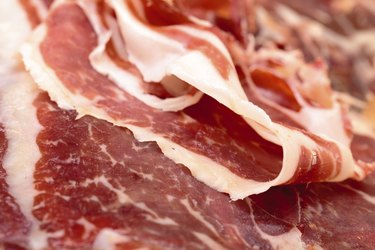
People have been eating pork since 7,000 B.C., according to the United States Department of Agriculture. Pork comes from hogs and is made into ribs, pork chops, loin, shoulder, sausage and bacon. Pork is the most popular meat worldwide, but not all cultures or religions eat pork because of various health disadvantages associated with its consumption. If pork is not handled safely or cooked correctly, it can pose serious health risks.
Video of the Day
Pork poses certain health risks from bacteria and resistant bacteria that cause infection and viruses. Eating pork contaminated with a food-borne bacteria can cause vomiting, fever, diarrhea, abdominal cramps and dehydration. Pork can become contaminated during slaughter, improper handling, leaving meat out for more than two hours or not cooking it long enough. Cooking is needed to destroy bacteria, but refrigeration slows the growth of bacteria. Resistant bacteria are another disadvantage of pork. Resistant strains of E. coli, salmonella and Escherichia are caused by treating hogs with antimicrobials, increasing their resistance to the drugs, notes a study published in the January 2001 issue of "Veterinary Quarterly."
Video of the Day
Roundworm Infestation
Roundworm infestation, also known as trichinosis, is a disadvantage of pork that can be prevented. Undercooked pork can contain the Trichinella spiralis parasite, also known as "pork worm." Eating the infested pork causes the cysts to break open in your intestines and grow into large adult roundworms. The roundworms multiply in your intestines and move through your gut into your bloodstream, invading muscle tissue, according to the National Institutes of Health. This can affect your heart, brain, lungs and diaphragm. Symptoms of roundworm infestation include cramps, diarrhea, fever, muscle pain or weakness and abdominal discomfort.
Heart Disease Risk
Saturated fats are one of the major risk factors for heart disease. Saturated fats cause your LDL cholesterol levels, the "bad" cholesterol, to rise, increasing your risk for heart disease. Saturated fat also increases your risk for having overweight or obesity, which directly impacts your heart and other organs. The saturated fat in pork comes from bacon, sausage and pork lard used in baking. The American Heart Association recommends reducing your consumption of saturated fats or replacing them with unsaturated fat choices.
Bladder Cancer Risk
Another disadvantage of pork is that it increases your risk of bladder cancer if you eat well-done or burnt pork often, according to Jie Lin, Ph.D., in an article published by the University of Texas M.D. Anderson Cancer Center. Pork cooked at high temperatures creates heterocyclic amines, HCAs, which can cause cancer. A 12-year study involving 844 patients with bladder cancer and 878 patients without bladder cancer gathered nutritional information and found that patients who ate pork and other red meats well-done had a significantly higher risk of bladder cancer.
- The Veterinary Quarterly: Human Health Hazards Associated With the Administration of Antimicrobials to Slaughter Animals
- University of Texas M.D. Anderson Cancer Center: Meat, Especially if It's Well Done, May Increase Risk of Bladder Cancer
- National Digestive Diseases Information Clearinghouse: Bacteria and Foodborne Illness
- PubMed Health: Trichinosis
- American Heart Association: Know Your Fats